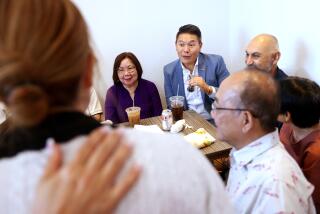Pro-Democracy Candidates Gain in Hong Kong Election
- Share via
HONG KONG — Pro-democracy candidates posted modest gains in legislative elections here Sunday but failed to achieve the strong results they had hoped for.
The pro-democracy camp secured 25 of 60 seats, up from 22, while pro-Beijing candidates held steady at 34. The final seat went to an independent, official results showed.
Under Hong Kong’s complex voting system, which critics charge is rigged in China’s favor, half the seats are directly elected by voters. The other half are chosen by 200,000 generally pro-Beijing professionals such as businesspeople and lawyers.
The pro-Beijing Democratic Alliance for the Betterment of Hong Kong, or DAB, won 12 seats in the direct vote, up from seven, under a system that puts a premium on vote distribution over absolute numbers.
“The DAB played it well,” said Christine Loh, head of Civic Exchange, a nonprofit group. “If you look at the popular vote and support, they don’t have it. They just did a better job spreading their votes around.”
Political analysts had touted the election as a litmus test for democracy at a time when the former British colony is caught between China’s preference for top-down rule and its citizens’ bid for a larger voice.
But a host of last-minute economic benefits announced by Beijing, scandals in the pro-democracy camp and reluctance on the part of voters to push China too far appeared to blunt democracy supporters’ momentum after early predictions that they would score big gains.
“Hong Kong is a commercial center. We need to be stable and stop kicking up so much dust,” said Ko Jin Hong, 50, a businessman who voted the pro-Beijing slate. “Why are we locking horns with Beijing when the rest of the world is trying so hard to do business with them?”
Joseph Cheng, a professor at the City University of Hong Kong, said the process was the real winner, given that a record 1.7 million of 3.2 million eligible voters turned out. Beijing did a good job managing expectations, he added, while the democratic forces failed to generate meaningful discussion on electoral freedom. “People may be less passionate about democracy issues,” he said. “The main challenge now will be to maintain unity and sustainability within the movement.”
Controversy surrounded the early returns, with the main pro-democracy party crying foul after counting was delayed amid reports that voters in some districts were turned away because of ballot box shortages.
For many, however, the day was an important opportunity.
“I guess I’m a virgin voter,” said first-time voter Priscilla Frank, 41. “It’s important that China and the rest of the world see us go to the polls. We have the right, we should use it.”
One of the new legislators is “Longhair” Leung Kwok Hung, Hong Kong’s best-known heckler and radical activist, famous for his long locks and Che Guevara T-shirt. “No need to call me Legislator Longhair,” he told fans. “Just call me Longhair.”
Hopes for a government elected entirely by popular vote by 2008 were dashed when China ruled in April that Hong Kong wasn’t ready for the responsibility. Beijing was apparently spooked by eroding support for the DAB and Tung Chee-hwa, Hong Kong’s chief executive.
The irony, analysts say, is that Beijing was forced to fight such a pitched battle in Hong Kong recently because of its own handpicked representative, Tung. His weak leadership on the SARS epidemic and the territory’s economy, plus his undue deference to Beijing, they say, spurred voters to march and demand more democratic rights.
“If anyone’s going to be called the father of democracy in Hong Kong, it’s Tung, although I’m sure he’s not going to want to acknowledge himself as the parent,” said Michael DeGolyer, a professor at Hong Kong Baptist University. “It’s a classic case of unintended consequences. Beijing’s intervention made people upset.”
Sunday’s election focused on education, jobs, trust and how to achieve greater democratic gains without alienating Beijing too much. Hong Kong’s legislature can oppose budgets and bills but can’t initiate them.
Scandals and mudslinging framed the election, including the arrest of pro-democracy candidate Ho Wai-to in China on charges of soliciting a prostitute.
Pro-democracy candidates said it was a set-up. Ho wasn’t able to comment because China sent him to six months in a reeducation camp without a trial.
China has offered sweeteners aimed at helping its DAB allies -- including a bridge with China and stronger air links designed to spur business in Hong Kong.
Some voters said this swayed them. “In the past seven years, the democrats have offered no solutions, only complaints,” said K.L. Sien, 78. “If Hong Kong elects these kinds of people, it will hurt us and scare away foreign investment.”
More to Read
Sign up for Essential California
The most important California stories and recommendations in your inbox every morning.
You may occasionally receive promotional content from the Los Angeles Times.












